Working Group Profile: LAMEM The Late Antique-Medieval-Early Modern Faculty Working Group
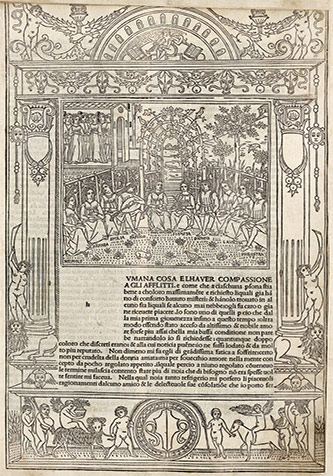
A printed edition of Boccaccio's Decameron (1492).
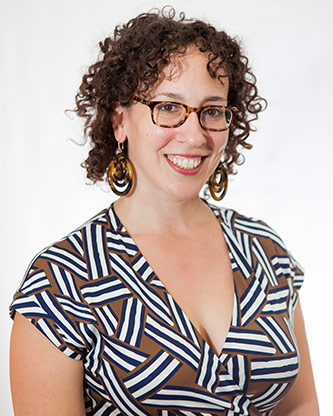
Professor Lauren Mancia, Department of History and Director of the Program for Studies in Religion
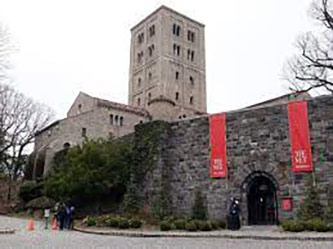
The Cloisters. Metropolitan Museum of New York
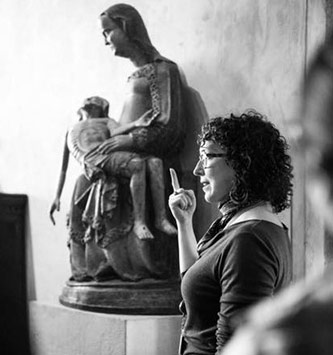
Professor Lauren Mancia giving a tour at the Cloisters
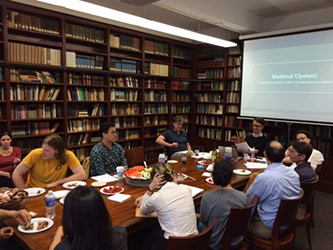
LAMEM monthly meeting in the Costas Library
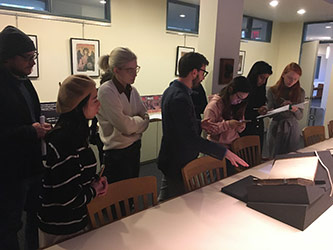
Undergraduate students in LAMEM fields visiting the Special Collections at Union Theological Seminary
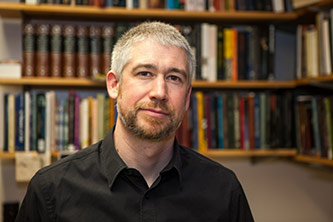
Professor Brian Sowers, Department of Classics
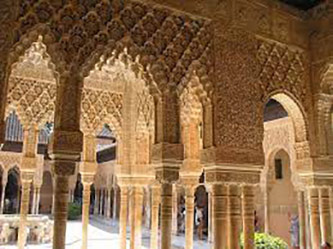
Alhambra. 14th century mosque. Grenada, Spain
A unique and active consortium of scholars is housed in the School of Humanities and Social Sciences. Since 2014, when the Late Antique/Medieval/ and Early Modern (LAMEM) consortium was organized by Professor Lauren Mancia (History), participants in this group of approximately 20 faculty members drawn from nine different departments and programs, have been meeting monthly in the Costas Library at Brooklyn College (before COVID; now on zoom). LAMEM faculty members study, research and teach the premodern world, i.e. the world before industrialization, broadly conceived as the world before 1700 CE, commonly called the "ancient," "medieval," and "early modern" periods. Even with the campus lockdown, the group has held their regular meetings on zoom all through the 2020-2021 school year. This past semester, LAMEM professors convened twice in February, and again in March, April and May with paired presentations and general discussion on such topics as Gender in the Middle Ages; Medieval Christian Devotion; Cultural Identity and Jewish Disaffiliation; and Ecology, Animals, and Eschatology.
The regularity of LAMEM meetings has given faculty members a safe space to share their scholarship-in progress and get much-needed feedback. This ad-hoc consortium has not only encouraged collaboration between LAMEM faculty members in their scholarship but also on course construction and teaching methods. While LAMEM provides a collegial home for Brooklyn College faculty, the group also aims to teach students and faculty how exciting cross-disciplinary dialogue in the humanities can be.
Brooklyn College is unique in CUNY in having a remarkable number of active LAMEM scholars studying the premodern world. Since spring 2014, 43 papers have been given at the monthly meetings by 23 different faculty members from History, English, Art, Judaic Studies, Modern Languages and Literatures, Studies in Religion, Classics, Philosophy, and Psychology. Not many private colleges in the New York area can boast of having such a large cohort of academics who conduct research in these related areas. Past colloquia have featured such topics as: "Round Table on Law in Late Antique and Medieval Jewish, Christian, and Muslim Traditions," "Theorizing 'Race' in Early Modern Spain," "The Faces of Chao Gui: Fact and Meaning in the Historiography of the Warring States and Former Han," and "The Making of a Black Panther: Plato's Influence on Huey P. Newton.”
Brooklyn College’s School of Humanities and Social Sciences is uniquely positioned for excellence in these related fields. Not only does BC house the only stand-alone Department of Classics in CUNY, featuring faculty who specialize in the languages and literatures of the ancient Mediterranean world, but also CUNY’s only Judaic Studies Department. Indeed, HSS faculty also includes an archaeologist of late antique Judaism, Karen Stern (History), a medieval philosopher, Andrew Arlig (Philosophy), a Byzantine art historian, Jennifer Ball (Art), a specialist in Zoroastrianism, Syriac Christianity, and early Judaism, David Brodsky (Judaic Studies), and a specialist in the early religions of China, Andrew Meyer (History). Furthermore, several other professors, in a variety of departments, work on pre- and early modern religion. The faculty members involved in LAMEM have active research agendas and several have won awards and recognition in their respective fields for excellent scholarship. Several adjuncts and GTFs in History, Religion, English, and Art History have also been affiliated with LAMEM. Marcus Elder, Benjamin Fleming, Aida Gureghian, Miranda Hadjuk, Trinity Martinez, Ali Noori, and Alessandro Zammataro are recent examples. The Dean of the School of Visual, Media and Performing Arts, Maria Connelli, a Renaissance art historian, has also presented at LAMEM.
While LAMEM was initially conceived as a group for faculty to share their work, this collective has always been open to student participation. As a result, regular student participants use the colloquia as a space to engage with cutting-edge scholarship and prepare for graduate school. For some students, LAMEM served as recruitment tool for interdisciplinary programs like Classics and Studies in Religion. For others, LAMEM has provided an outlet for their interest in the pre- and early modern world by connecting them to courses outside of their home departments that are related to their academic interests.
Many LAMEM student participants have gone on to do graduate work in a related area. Among these are Teanu Reid ’15, Yale history Ph.D. candidate; Laurence Bond 18, Johns Hopkins history Ph.D. student; Francisco Manitas ’19, CUNY Graduate Center history Ph.D. student; Andrew Rabin ’18, Rutgers philosophy Ph.D. student; Montgomery Stewart ’20, currently applying to Ph.D. programs in classics and art history); Grace Paré ’20; about to start an M.A. program in liberal studies and religion); and Miriam Bernstein ’21; currently applying to Ph.D. programs in near eastern languages and cultures.
Next academic year will be a busy one for the LAMEM consortium. Professor Mancia and Brian Sowers of the Department of Classics will lead the Robert Viscusi Faculty Reading Group in the Fall 2021 and are planning a conference for the Spring 2022. The Viscusi Reading Group will read and discuss The Lives of Objects: Material Culture, Experience, and the Real in the History of Early Christianity (Chicago, 2020) by Maia Kotrosits. Using the lens of pre-modern religious societies in the Mediterranean region, Dr. Kotrosits’ book will serve as a springboard for conversations about the connections between ancient and contemporary worlds, with a look at the ways that material culture has transformed human life and mediated our social and emotional experiences. Maia Kotrosits’ book does not require any scholarly expertise in premodern studies and/or religious culture and any and all inquisitive faculty are invited to join. The group will have four monthly Thursday meetings on Zoom at 12:30 p.m. Interested faculty should contact Lauren laurenmancia@brooklyn.cuny.edu) or Brian (bsowers@brooklyn.cuny.edu).
In the Spring 2022, the LAMEM consortium is planning a conference and edited volume entitled, Fragments of Experience: Approaching “Lived Religion” from Late Antiquity to the Central Middle Ages. The conference and book seek to address the ways that scholars of Late Antiquity and the Middle Ages, can access what premodern people “really” felt and believed about their own religions. As the conference organizers put it, “Recovering an historical community’s religious experiences, especially the various ways spiritual conviction can intersect with and, at times, run perpendicular to a religion’s institutional features, is a delicate, oftentimes difficult, task.” Scholars of Judaism, Christianity, and Islam in Late Antiquity to the Central Middle Ages (ca. 300–1100 C.E.) are particularly concerned with drawing insights from extant documents which are not as plentiful as those from either earlier or later periods.
The edited volume will bring together a wide range of specialists from interrelated fields. Among the contributors will be professors of art, religion, and philosophy from a variety of public and private universities including New York University, Boston College, Duke University, Harvard Divinity School, University of Wisconsin-Madison, University of Notre Dame, UCLA, and of course, Brooklyn College.
The School of Humanities and Social Sciences recognizes the LAMEM collective as a Center of Excellence that can continue to enhance Brooklyn College’s reputation as a unique academic hub that exhibits scholarly excellence in many fields. Furthermore, by inviting scholars from other CUNY or New York-area schools to present at the colloquium each year, LAMEM at Brooklyn College is helping to generate an expanding network of medieval and renaissance scholars both within CUNY and New York City-wide. Indeed, the colloquia welcome any faculty members, staff and students who consider themselves scholars of the period before "modernity," in any geographical region. As a result of LAMEM’s ongoing efforts, this unique collective of active researchers and teachers shows us how, by giving faculty across departments with shared interests, the opportunity to talk to each other regularly about their research, great collaborations and community can grow at Brooklyn College. Our readers can find more about LAMEM at their website.
Back to Critical Thinking — May 2021





